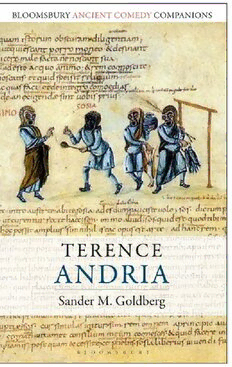
Terence: Andria PDF
161 Pages·2019·1.617 MB·English
Most books are stored in the elastic cloud where traffic is expensive. For this reason, we have a limit on daily download.
Preview Terence: Andria
Description:
Launching a much-needed new series discussing each comedy that survives from the ancient world, this volume is a vital companion to Terence’s earliest comedy, Andria, highlighting its context, themes, staging and legacy. Ideal for students it assumes no knowledge of Latin, but is helpful also for scholars wanting a quick introduction. This will be the first port of call for anyone studying or researching the play.Though Andria launched Terence’s career as a dramatist at Rome, it has attracted comparatively little attention from modern critics. It is nevertheless a play of great interest, not least for the sensitivity with which it portrays family relationships and for its influence on later dramatists. It also presents students of Roman comedy with all the features that came to characterize Terence’s particular version of traditional comedy, and it raises all the interpretive questions that have dogged the study of Terence for generations. This volume will use a close reading of the play to explore the central issues in understanding Terence’s style of play-making and its legacy.Though Andria launched Terence’s career as a dramatist at Rome, it has attracted comparatively little attention from modern critics. The play nevertheless presents students of Roman comedy with all the features that came to characterize Terence’s particular version of traditional comedy, and it raises all the interpretive questions that have dogged the study of Terence for generations. The first two, comparatively brief chapters of this study sketch the basics of the dramatic tradition Terence inherited, the conditions under which he worked, and the basis for his reputation as something of an artistic outlier. These last include his putative struggles with contemporary dramatists and audiences, his innovative use of Greek models, his manipulation of Roman dramatic conventions for new effects, and his experiments with Latin style. Chapter 3 uses a close reading of the play to explore the central issues in understanding Terence’s idea of play-making and the interpretive problems the play raises for modern readers. Chapter 4 surveys the play’s influence as both a script and a book on later readers, while Chapter 5 explores the difficulties translators have faced in representing Terentian comedy to readers unable to experience his plays in their original form. Bibliographic aids include an annotated list of works recommended for further reading and suggestions for translations suitable for various purposes. Emphasis is on works readily accessible in English, but not to the exclusion of important works in other European languages.
See more
The list of books you might like
Most books are stored in the elastic cloud where traffic is expensive. For this reason, we have a limit on daily download.
